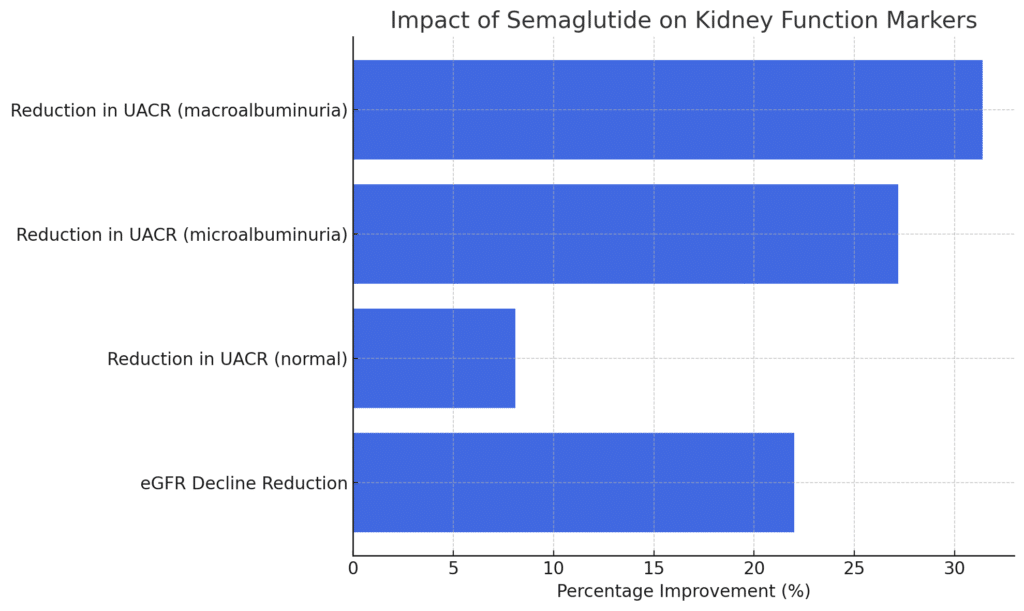How Semaglutide (Ozempic & Wegovy) Could Help Protect Your Kidneys
How Semaglutide (Ozempic & Wegovy) Could Help Protect Your Kidneys
When most people think of medications like Ozempic and Wegovy, they often associate them with weight loss or managing type 2 diabetes. However, these medications, which contain the active ingredient semaglutide, may offer much more than that. Emerging research indicates that semaglutide could help protect your kidneys, particularly if you have conditions like type 2 diabetes, obesity, or cardiovascular disease. This new benefit is a significant development for people who are at high risk of kidney disease.
The Connection Between Obesity, Heart Disease, and Kidney Health
Both obesity and heart disease have been known to increase the risk of kidney disease. Carrying extra weight not only impacts your joints and energy levels but also puts a considerable amount of stress on your internal organs, including your kidneys. Over time, this stress can cause kidney damage, which can be difficult to reverse.
Cardiovascular disease also plays a role in kidney health. The kidneys depend on healthy blood flow to function, and any condition that affects your heart can also affect your kidneys. This is why it’s crucial to find ways to protect kidney function in people with both heart disease and obesity, as well as in those with type 2 diabetes.
New Research: Ozempic and the Potential to Protect Kidney Function
Recently, scientists have been studying how Ozempic, a glucagon-like peptide-1 (GLP-1) receptor agonist, could offer protection for kidney function. In a large clinical trial, researchers discovered that semaglutide might slow the progression of kidney disease in people with type 2 diabetes. This is a big deal for those at risk, as kidney disease can be life-threatening and often leads to dialysis or the need for a kidney transplant.
Even more exciting is that semaglutide could help people beyond just those with diabetes. At the 61st European Renal Association Conference, researchers shared new findings suggesting that semaglutide may also protect kidney function in people with obesity and cardiovascular disease, even if they don’t have diabetes. This broadens the potential impact of the medication and offers hope to millions of people who may be at risk of kidney disease.

What the Study Found
The SELECT trial, which included over 17,000 participants, looked closely at the effects of Ozempic on kidney function. After an average follow-up of 3.5 years, the results were promising. The researchers found that people taking semaglutide experienced 22% fewer adverse kidney-related events than those in the placebo group. These adverse events included a significant decline in kidney function, death from kidney disease, or the onset of macroalbuminuria (a condition where large amounts of the protein albumin leak into the urine, indicating kidney damage).
One of the study’s lead researchers, Professor Helen M. Colhoun, stated that by addressing key markers of kidney health, semaglutide could play a crucial role in reducing kidney-related complications like chronic kidney disease and end-stage renal disease. This could significantly improve the quality of life for individuals with obesity who are at risk for these conditions.
Ozempic and its Effect on Kidney Health Markers
To understand how semaglutide helps the kidneys, the researchers examined two key indicators of kidney health: the estimated glomerular filtration rate (eGFR) and the urinary albumin-to-creatinine ratio (UACR).
eGFR is a measure of how well the kidneys are filtering waste from the blood. In the study, participants who received semaglutide had a much slower decline in their eGFR compared to those who took a placebo. This suggests that semaglutide can help maintain better kidney function over time, even in people with pre-existing kidney issues.
UACR measures the amount of albumin (a type of protein) in the urine compared to creatinine (a waste product). A high UACR can be a sign of kidney damage. The study found that semaglutide reduced UACR levels in participants, especially those who already had early signs of kidney damage, which means it may help prevent further kidney deterioration. For example, participants with macroalbuminuria saw a 31.4% decrease in their UACR levels after using semaglutide, while those with microalbuminuria experienced a 27.2% decrease.
How Losing Weight Benefits Kidney Function
Dr. Mir Ali, a bariatric surgeon, explains that being significantly overweight or obese puts extra stress on all the organs in the body, including the kidneys. This stress forces the kidneys to work harder than they should, which can lead to long-term damage.
When someone loses weight, it helps relieve some of this pressure on the organs. Additionally, obesity causes inflammation throughout the body, which can further harm organs like the kidneys, heart, and lungs. Reducing inflammation through weight loss can improve overall organ function, which is why semaglutide’s ability to aid in weight loss is also seen as a protective factor for kidney health.
Why Cardiovascular Disease Affects Kidney Function
The heart and kidneys are closely connected. The kidneys’ primary job is to filter blood, so they depend on the heart to pump enough blood for them to function properly. When the heart is weakened due to cardiovascular disease, the kidneys may not receive enough blood to do their job effectively.
Cardiovascular disease can also damage the blood vessels in the kidneys, reducing their ability to filter waste. This creates a vicious cycle, as poor kidney function can, in turn, negatively affect heart health.

The Future of Kidney Health Research with Semaglutide
Experts agree that while the current research on semaglutide is promising, more studies are needed to fully understand its long-term benefits for kidney health. Dr. Cheng-Han Chen, a cardiologist, emphasized that slowing the progression of kidney disease is crucial, particularly for those who are already dealing with obesity or heart disease. Given that kidney disease affects a large portion of the American population, any treatment that can reduce the risk is a welcome development.
It’s also worth noting that Ozempic has been shown to improve heart health, even in patients who didn’t lose a significant amount of weight. This has led researchers to wonder whether semaglutide’s protective effect on the kidneys could also occur independently of weight loss. Could semaglutide protect the kidneys through another mechanism, such as reducing inflammation? Future studies will hopefully answer that question.
Conclusion: What This Means for You
If you are managing type 2 diabetes, obesity, or cardiovascular disease, semaglutide (Ozempic or Wegovy) could offer more than just weight loss or better blood sugar control—it may also help protect your kidneys. With the rising risk of kidney disease among people with these conditions, this is an exciting potential benefit that could improve overall health and quality of life.
As always, it’s important to consult your doctor to see if semaglutide is the right choice for your health needs. With ongoing research, we may see even more ways this medication can benefit people at risk for kidney disease in the near future.
To learn more about how you can access Ozempic or Wegovy and explore affordable options for your prescription, visit our online prescription referral service Over the Border Meds today!
References:
European Renal Association Conference, SELECT Trial Presentation (2023) – Research presented at the 61st European Renal Association Conference discussed the impact of Semaglutide on kidney function in patients with obesity and cardiovascular disease.
Colhoun, H. M. et al. (2023). “Semaglutide’s Role in Kidney Health: Findings from the SELECT Study.” University of Edinburgh, United Kingdom.
Medical News Today (2023). “How Semaglutide Protects Kidney Function in Patients with Diabetes, Obesity, and Heart Disease.” Interview with Dr. Mir Ali and Dr. Cheng-Han Chen.
National Kidney Foundation. “Understanding eGFR and UACR: Key Markers of Kidney Health.”
For more information on chronic kidney disease management, you can refer to the BC guidelines here.
